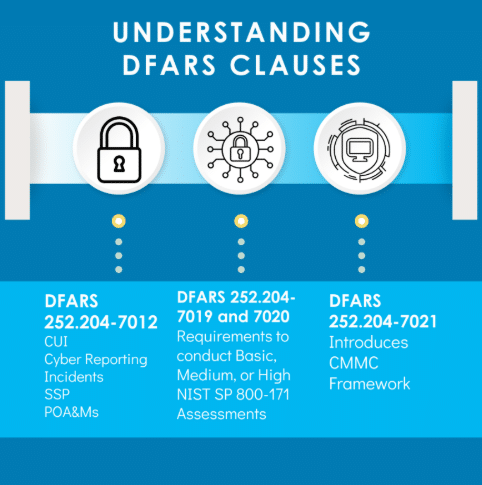
Is Your Company Losing Proposal Points Without Knowing It?
How CMMC is Reshaping Proposal Scoring, Teaming, and DoD Access CMMC Level 2 is rapidly changing how defense contractors compete. It is no longer confined
CMMC is here! Register for our free webinar with guests from C3PAOs – Nov 18 @ 1PM EST. Save Your Spot →
Home » Cybersecurity Compliance » CMMC Compliance » DFARS Compliance
Achieve DFARS compliance faster and protect your competitive edge with Alluvionic’s step-by-step approach.
The Defense Federal Acquisition Regulation Supplement (DFARS) is a set of regulations meant to ensure that defense contractors maintain adequate cybersecurity measures. The DFARS Clause 252.204-7012 requires contractors to protect covered defense information (CDI) and controlled unclassified information (CUI). This clause also requires contractors to establish and maintain controls over the dissemination of information within their organizations and take steps to protect the confidentiality of such information. Contractors who violate this clause may be subject to criminal and civil penalties.
The rule established a DoD Assessment Methodology and Cybersecurity Maturity Model Certification (CMMC) framework to evaluate contractor compliance with cybersecurity standards and increase the security of unclassified data throughout the DoD supply chain.


Defense contractors that are not compliant with DFARS can face severe consequences including contract suspension, termination, or fines. In addition, failing to comply with DFARS can damage a company’s reputation and make it more challenging to do business.
The Department of Defense (DoD) has implemented a series of clauses within the Defense Federal Acquisition Regulation Supplement (DFARS) aimed at strengthening cybersecurity for contractors and subcontractors who handle sensitive DoD information. These DFARS clauses are essential for safeguarding Controlled Unclassified Information (CUI) and protecting the defense supply chain from cyber threats. Compliance with these clauses is mandatory for contractors working on DoD contracts and helps to ensure their systems and processes meet the rigorous standards required to secure federal information. Here, we’ll cover each clause’s primary objectives and requirements, along with insights into how they work together to support the DoD’s cybersecurity goals.


The DFARS clause 252.204-7012, titled “Safeguarding Covered Defense Information and Cyber Incident Reporting,” mandates specific protections for Controlled Unclassified Information (CUI) and requires reporting of cyber incidents. Here are the key points:
Information Sharing and Analysis: In some cases, contractors must provide the government with access to information related to the incident. This clause underscores the DoD’s commitment to understanding the nature of cyber incidents affecting contractors and ensuring continuity in national defense operations.
Clause 252.204-7019, titled “Notice of NIST SP 800-171 DoD Assessment Requirements,” adds an extra layer of cybersecurity requirements to contractors by formalizing the need for an assessment of NIST SP 800-171 compliance.
The DFARS clause 252.204-7020, titled “NIST SP 800-171 DoD Assessment Requirements,” outlines additional measures beyond the Basic Assessment for contractors who may be required to submit to a Medium or High NIST SP 800-171 DoD Assessment based on contract requirements. This clause focuses on government oversight and the ability to verify contractors’ compliance at a higher level when needed.
Documentation and Cooperation: Contractors must be prepared to provide evidence of their cybersecurity controls, including system logs, policies, and procedures. Maintaining up-to-date documentation is essential for successful compliance in the event of a government-led Medium or High Assessment
The Cybersecurity Maturity Model Certification (CMMC) program introduced through DFARS clause 252.204-7021 establishes a cybersecurity framework specifically designed to protect CUI within the defense industrial base. The clause formalizes requirements for contractors to achieve CMMC certification at the level designated by the contracting activity, depending on the sensitivity of the information they handle.


Complying with these DFARS cybersecurity clauses is not only a contractual obligation for DoD contractors but also a strategic business necessity. Non-compliance can result in lost contracts, penalties, and potential exclusion from future DoD contract opportunities. Furthermore, by adhering to these clauses, contractors strengthen their cybersecurity posture, protect sensitive defense information, and contribute to national security.
These clauses work together as a comprehensive security strategy:
DFARS compliance can be complex, but understanding these requirements and incorporating them into cybersecurity planning enables contractors to successfully navigate the DoD’s cybersecurity landscape.

How CMMC is Reshaping Proposal Scoring, Teaming, and DoD Access CMMC Level 2 is rapidly changing how defense contractors compete. It is no longer confined

What to Know About the November 10 Rule You may have heard that November 10, 2025 was a big day for cybersecurity compliance in the

ICYMI: Insights from Our Webinar — CMMC Contract Clause DFARS 252.204-7021 Explained The CMMC landscape shifted in a major way with the release of DFARS







It’s simple. A project that gets off on the right foot is likely to take a successful journey. So why do so many projects fail? Use this checklist to assure your project succeeds from the beginning.

Whether you need project management, process improvement, cybersecurity, product development, training, or government services, Alluvionic has the expertise to provide Peace of Mind and Project Assurance®.